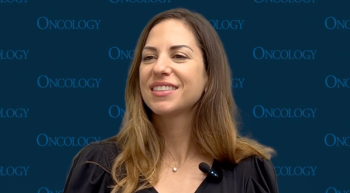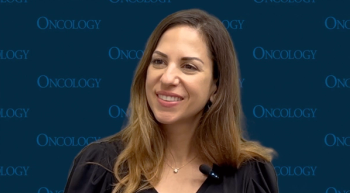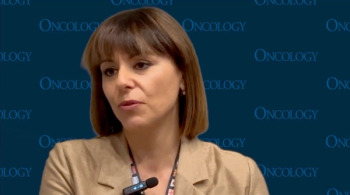
Oncology NEWS International
- Oncology NEWS International Vol 11 No 6
- Volume 11
- Issue 6
FTI Achieves Long-Lasting Responses in Myelodysplastic Syndrome Patients
SAN FRANCISCO-The investigational farnesyl transferase inhibitor (FTI), R115777 (tipifarmib, Zarnestra) causes robust clinical responses in some patients with myelodysplastic syndrome (MDS), but these responses are not correlated with the drug’s ability to inhibit farnesyl transferase, according to a study presented at the 93rd Annual Meeting of the American Association for Cancer Research (abstract 4959).
SAN FRANCISCOThe investigational farnesyl transferase inhibitor (FTI), R115777 (tipifarmib, Zarnestra) causes robust clinical responses in some patients with myelodysplastic syndrome (MDS), but these responses are not correlated with the drug’s ability to inhibit farnesyl transferase, according to a study presented at the 93rd Annual Meeting of the American Association for Cancer Research (abstract 4959).
The hypothesis-driven clinical trial was a collaboration between M.D. Anderson Cancer Center, where the patients were accrued, and the H. Lee Moffitt Cancer Center and Research Institute, Tampa, where the biochemical correlative work was carried out.
"In every patient, the molecular target was hit, but only 30% responded," said researcher Said M. Sebti, PhD, professor of oncology, biochemistry and molecular biology, Moffitt Cancer Center. "Our study tells us that inhibition of farnesyl transferation is critical for response, but, by itself, it does not correlate with response." Dr. Sebti is also director of Moffitt’s Drug Discovery Program.
In the study, 6 of 20 evaluable myelodysplastic syndrome patients achieved a hematologic partial or complete response to R115777, said lead researcher Razelle Kurzrock, MD, professor of medicine, M.D. Anderson Cancer Center. Some of the responses have been quite durable, lasting up to 15 months. Responses were seen at all dose levels, and did not correspond with the ability of the drug to hit its molecular target and inhibit farnesyl transferase.
The study suggests that the six patients who responded must have a molecular signaturea blueprintthat requires farnesyl transferase for tumor survival. "That’s why we see responses in these patients," Dr. Sebti said.
Eligible patients had received less than two prior therapies and had adequate renal and hepatic function. Myelodysplastic syndrome patients of all subtypes were included in the trial.
The patients received R115777 orally twice a day for 3 weeks of a 4-week cycle. Dosing started at 300 mg twice daily and increased up to 900 mg/d until patients showed toxicity or no longer benefited from therapy. Three patients responded at 600 mg/d, two at 800 mg/d, and one at 900 mg/d. "There was more than 80% farnesyl transferase inhibition with every patient," Dr. Sebti said. The enzyme did not come back to basal level even 1 week after stopping the drug.
Six of the patients, but only two of the responders, had Ras mutations, indicating that these mutations did not correlate with response, Dr. Kurzrock said. In myelodysplastic syndrome, 30% to 40% of patients have a Ras mutation, making it an interesting disease for studying FTIs.
The main serious side effect was grade 3-4 myelosuppression. "Other toxicities at grade 3-4 were observed, but they were less frequent," Dr. Sebti said.
Dr. Kurzrock noted that although the 30% response rate is modest, "the responses occur at doses that have minimal toxicity, even in elderly patients." The patients in the study ranged in age from 50 to 83 years old (median, 66).
As predicted, R115777 was a selective inhibitor of farnesyl transferase and not geranylgeranyl transferase (GGTase). "We have seen this in animal models, but it is nice to see it in patients," Dr. Sebti said.
The researchers also looked at the effect of the drug on oncogenic signaling pathways. R115777 inhibited the prenylation of the exclusively farnesylated protein HDJ-2 in all patients, but this did not correlate with a clinical response. "With this drug, there seems to be some effects on oncogenic signaling pathways, but they do not correlate with response," Dr. Sebti said.
Since one of the downstream effects of Ras is the induction of cytokine synthesis, the researchers also measured serum levels of TNF (tumor necrosis factor)-alpha. Responding patients had a 42% drop in TNF-alpha, while nonresponders experienced an 11% increase.
The study reveals that farnesyl transferase targets "are just housekeeping proteins," Dr. Sebti said. "What we need now is the blueprint for the tumors that depend on farnesyl transferase," he said.
In a future study, the researchers will examine the molecular profiles of all patients who respond to the drug, Dr. Sebti said. "We are looking for profiles that could lead us to predict which type of myelodysplastic syndrome patients will respond."
Articles in this issue
over 23 years ago
Gleevec Effective as First-Line Therapy of CML: IRIS Trialover 23 years ago
Curcumin May Enhance TRAIL-Induced Cancer Cell Deathover 23 years ago
Symptom Clusters or Groupings Are Common in Cancer Outpatientsover 23 years ago
Allogeneic BMT Ups 5-Year EFS in Ph- ALLover 23 years ago
HIV-1 Vaccine Proving Safe, Immunogenic in Humansover 23 years ago
ACS to Fight Tobacco ‘Pandemic’ Worldwideover 23 years ago
Aspirin Helps Prevent Recurrent Large Bowel AdenomasNewsletter
Stay up to date on recent advances in the multidisciplinary approach to cancer.



































